Strictly Personal
Buhari, Emefiele’s handshake across our heads, By Festus Adebayo
Published
2 years agoon
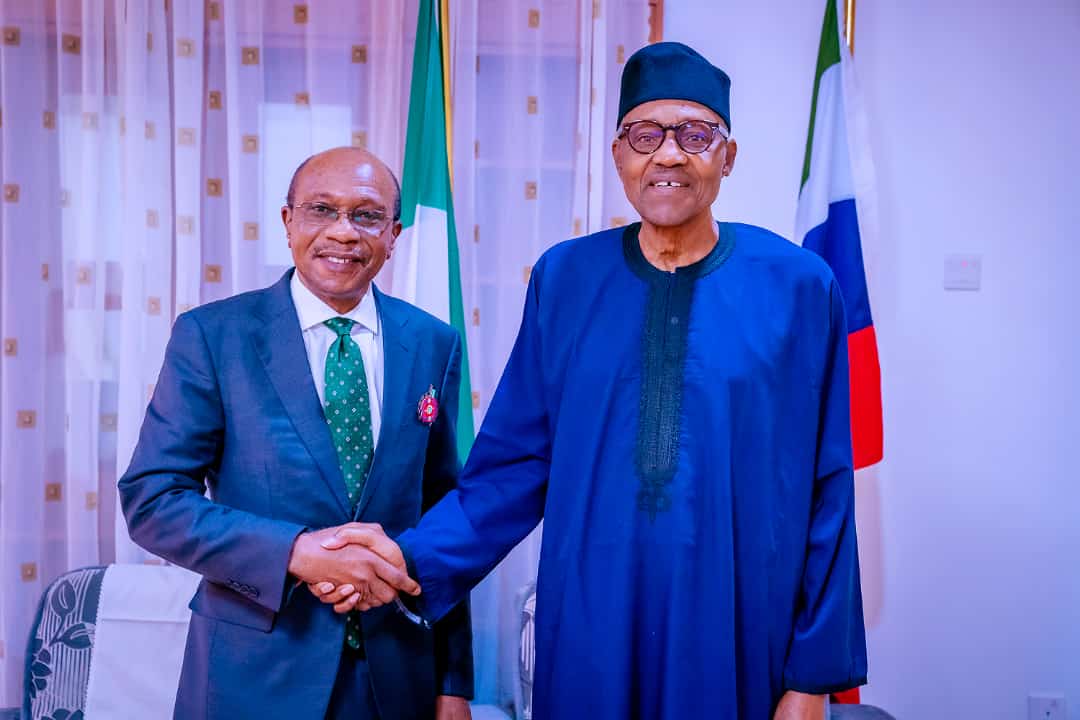
This week, there will be a stampede in Nigeria. Stampede for the new Nigerian currencies. The Central Bank of Nigeria (CBN’s) policy of currency exchange has been variously lauded for its power to purge the system of slush funds warehoused for election purposes. However, its symptom as a vengeful political weapon which manifests as preparations towards the January 31 expiration of old notes reach their crescendo, have revealed the rump of this very shoddy policy.
The new Naira notes are nowhere in circulation. They are however scattered at weekend party venues and in the warehouses of politicians. The currency change system is so inept that politicians are weaponizing its effeminacy, through commercial banks, as an opportunity to mop up the new notes of Godwin Emefiele, Nigeria’s ex-assumed fugitive Central Bank of Nigeria (CBN) Governor, known in underground circle as Meffy’s new notes. In Emefiele’s Nigeria, there is weird politics among functionaries of a government that is immersed in and is a victim of its own incompetence. It is the ordinary woman selling fish in the market and the poor who will suffer this weird politics being played between the taciturn megida – Nigeria’s President Muhamadu Buhari – and Meffy, his sidekick, as well as the strange birds which have made for themselves a comfortable nest in the inept system.
Did you see the picture that adorned the front pages of some Nigerian newspapers last Friday? It was that of Emefiele. He was locked in a hand-pumping pose with his principal, Muhammadu Buhari. In the photo, the duo was shawled in what appeared to be a slapstick, titivating session. It was one you would find among folks who had just won a million-dollar tombola. Or the unconscionable camaraderie during the signing of the Strategic Arms Limitation Talks (SALT). Or where a recipient had just been invested with a membership of the biology of Alfred Nobel, through being inducted into the highly prestigious Nobel hall of fame.
The said picture clearly disguised the infamy that undergirds it. Or the grits of what it innocuously advertised. Those days when cigarette smokers puffed at their sticks, in disdain of those who mocked them, Yoruba equalized the puffed smoke as akin to the smoker ensuring that a sparkle of fire flared over his enemies’ head – o gbe’na g’ori ota. That handshake shared similar unspoken victory paraphernalia with those smokers’ grandstanding. Enveloped together in this camaraderie at Aso Rock, apparently like clinking wine glass cups to mark a full denouement of a grisly drama, were the Chief of Staff to the president, Ibrahim Agboola Gambari, Borno governor, Babagana Zulum and Minister of Foreign Affairs, Geoffrey Onyeama.
That picture purely disguised the crises that signpost the life of Nigeria. Or the bedlam that is the country’s economy and finance. If you are a student of semiotics and are conversant with the politics of meaning in Nigeria’s journey to the 2023 election, the import and purport of Meffy and his boss’ kindergarten pose for a photo-op would dawn on you in its rawest manifestation. If you needed a perfect fit to that ancient emoji image conjured by the saying that Nero fiddled while Rome burns, look no further from this infamous photograph.
Why does a man who had just returned from “an annual leave” and is meeting his principal, ostensibly to brief him on what had transpired during his holiday abroad, need to pose for a public photograph with his boss? Why was the mood celebratory, with a convergence of the inner machine of Aso Rock giving the photo-op a life that is as large as a dinosaur’s? The reality oscillates in the firmament of the darkest minds of Nigeria’s I-don’t-care governance apparatus. It is an apparatus that preferences brackish politics at the expense of the people’s welfare.
A few kilometers from the Aso Villa where that celebration was taking place, Nigerians were gnashing their teeth in petrol queues. Nigeria is currently embroiled in one of the most grinding petroleum scarcity rituals of its existence, with government advertising an apparent lack of manhood over the matter. At petrol stations at the moment is a live dramatization of the chaos that Buhari will bequeath to the next administration.
If the DSS does it job as it should, Buhari and Meffy would, last Thursday, most probably not be lost in that miasma they wrongly saw as the celebration of their political enemies. They would most probably be busy finding solutions to the economic drift. Petrol stations are today where the greatest treason against a sitting government is committed without any scintilla of care in the world. The stations advertise Wole Soyinka’s season of anomie and a government without direction.
At petrol stations, people freely and openly singe this government’s flesh; a government they see as the worst in the history of Nigeria. Again, at petrol stations is where you will find the strongest manifestation of class in Nigeria. Nigerians who do not experience the dual tyranny of Buhari and Meffy and who know none of their joint pains go buy their fuel as high as N300 a liter while the ordinary Nigerians queue at major petroleum distribution marketers’ stalls in serpentine, multiple kilometer lines. They are in search of a commodity that is domiciled in the bowels of Nigerian soil. Gone are the days when petrol stations wait for government to announce price hike before advertising this on their meters. Today, in underscore of the effeminacy of the government in Abuja, various meter prices are advertised without any fear. It is where you will find out that there is no government, no governance but photo-ops.
When I see such governmental castration of fervor and ability as demonstrated by the bedlams at petrol stations, what my mind hovers over is that favourite South African short story of mine entitled The Dube Train. It was authored by Drum magazine journalist, Can Themba, one of the collectives of Apartheid journalists like Nat Nakassa, who blended journalism with creative writing. This they weaponized as social commentaries against the ills of the white government and the crass disconnect of government from the pains and pangs of the people.
In the said Themba story set in a busy train coach heading for Dube Town on a Monday morning, a woman is physically assaulted by a tout called tsotsi and the passengers say nothing. A woman then spanks the men “Lord, you call yourself men! You poltroons! You let a small ruffian insult you. Fancy, he grabs at a girl in front of you….you might be your daughter…if there were real men here, they’d pull him off and give him such a leathering he’d never sit down for a week.” The tout pulls a knife, stabs a man who nonetheless hauls him out of the train, to his death. The passengers winced, without a whimper. The ending that Themba gives the story is what fascinates me here and in which I find a corollary with the Nigerian situation under Buhari and Meffy: “it was just another incident in the morning Dube Train” as “the crowd is greedily relishing the thrilling episode.”
Like the passengers in that Dube Township train this Monday morning, Nigerians no longer bothered about the absence of governance in their lives. Indeed, they are relishing the grisly episode and waiting for the affliction to expire in May. With cost of living hitting the firmament and food prices a whiff off the cloud, the prayer is that Nigerians do not hit that macabre and astonishing narrative of what happened in the biblical chapter called the Kings. It is a ghoulish narrative of two Israelite mothers who, hungry and unable to endure the pangs, agreed to mutually devour their children for supper. It was a very challenging, governmentally rudderless time in the city of Samaria which was under siege and embroiled in an unprecedented food scarcity. This resulted in these mothers’ cannibalism. Already in Nigeria, the economy is pushing the people to Samaria. We witness the extreme of crimes that even criminologists find no corollary to in crime literature. Pastors are faking their own kidnaps so that they can extract illicit profit from their congregation; sons are killing their parents for rituals. It is like Samaria, here we come.
Yet, Meffy and his boss are sucking into the 2023 election politics with so much aplomb and Gothic pleasure. That picture may be saying all that with an unspoken magistracy of the power they think they wield. You ask how? All right. You will remember that since the president’s political party, the All Progressives Congress, (APC) concluded its party primary last year, throwing up a man who the presidency’s disdain and disavowal for were known to even babes and suckling, Aso Rock was said to have gone the route of its notorious ethnic politics? Is that still convoluted?
Godwin Emefiele was drafted into this odious rat race by the same cabal. That selfsame Aso Rock consort got depleted by one, with the passage of that media mogul who Meffy was pictured with in a sequestered and groveling posture. The consort, which held the key to the heart of the presidency, had been propelling him like a marionette since he became the CBN governor. It was the one that asked him to throw his hat into the ring of the APC presidential contest and was miffed that its lapdog lost to its adversary. This then should explain why Meffy was so audacious in his awkward quest for the presidency while he was yet the CBN governor. He was even so audacious as to sneak to his Ward 6 in the Ika South Local Government Area of Delta State, to register as a card-carrying APC member. This much was confirmed by Nduka Erikpume, chairman of his ward, who confirmed it to the press last year. This is in violation of Section 9 of the CBN Act, 2007, to wit that, “The Governor and the Deputy Governors shall devote the whole of their time to the service of the bank and while holding office shall not engage in any full or part-time employment or vocation whether remunerated or not…”
When this noxious ambition crumbled, like a dog in fruitless scamper after a mongrel, Meffy, defeated, wagged his tail cowardly and retreated into his cage. No sanction from the system for this impunity. And he lived happily ever thereafter.
Knowing that the overall boss lacks a mind of his own, but apprised of his disdain for the party fellow, the remnants of the cabal struck a deal with one of the contenders for the office of the president. If you are in doubt about this, ask Nyesom Wike. You remember the Rivers governor’s famous or infamous volley of diatribes last year against those who he alleged – and I paraphrase – “because someone in Aso Rock promised you presidency, you can look down on others!”? All right. Meffy is alleged to be in cahoots with these folks and, in street gossip, has benefitted this clan with billions of dollars through the duplicitous exchange rate policy. He is also rumoured to be inside the cocoon of the cabal’s ethnic politics. So, the role of Meffy, as the Chancellor of Exchequer, in this ethnic power expansionism, is to muzzle the party folk, money-wise, in the build-ups to the February 25 polls.
The drama against Meffy is thus a political rebound from the flank of the party folk, with the target of paying back the CBN governor in his own coins. The DSS is easily an anvil of this vendetta. It had filed an ex-parte application to have Meffy detained for what panned out to be the whole period of the elections, on allegations of fraud and terrorism financing. In the application, it claimed that preliminary investigation revealed that Emefiele was involved in acts of terrorism financing, fraudulent activities and involvement in economic crimes of national security dimension. While dismissing the application, the Federal High Court said it would not be stampeded into hounding “an innocent man” and subsequently issued an order restraining the DSS from “arresting, detaining or questioning” the CBN governor.
At the outset of this plan to get him arrested, and aware that there was an orchestrated plan to get him arrested by the DSS, Emefiele easily jumped on the presidential plane carrying his principal godfather to the US-Africa Leaders’ Summit in Washington DC which held between December 13 and 15, 2022. However, told that his assailants were still on the prowl, Emefiele turned self into a temporary fugitive, so much that while Buhari returned to Abuja a day after the conclusion of the summit, Meffy was nowhere to be found.
An online newspaper claimed that as he returned to Nigeria from his temporary exile last week Monday, a detachment of military police escorted him from the Abuja airport. “Emefiele… security is bigger than that of the President,” said the newspaper, a claim that is yet to be refuted.
However, while it is within his presidential power to take a “detractors, go to hell!” photograph with Emefiele, moral authority convicts Buhari for not at least attempting to investigate the pot-pourri of allegations against this financial sidekick of his. Never in the history of CBN governorship had any of its heads been totally enveloped by an odious and scandalous tarpaulin of financial malfeasances as this. While we may be eager to dismiss the allegation of financing terrorism against Meffy as trumped-up vendetta, allegations that Emefiele has humongous stakes in twelve banks are confounding and needed to be dispensed with. This is followed by similar allegation that he has turned the CBN into an Alaba market of Stone Age prebend exchanges where personal rents are haggled as they do in a fish market. But not Buhari. He doesn’t have a history of auditing his appointees for wrongdoings. He rather abets them by his weird silence.
Where then will this Emefiele grotesque drama end?
You may like
-


Niger citizen knocks President Tchiani for neglecting critical issues at home to peddle rumours against Nigeria
-


Dumping England for Nigeria the best decision of my life— Ademola Lookman
-


Nigeria resumes mining in Zamfara state
-
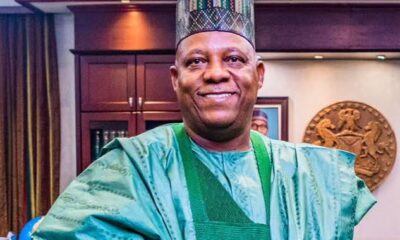

Nigeria’s future is very bright, we’ll overcome challenges, VP Shettima says
-


‘Pray for leaders to serve you diligently,’ President Tinubu tells Nigerians
-


Nigeria on the right path despite hardship, criticism— President Tinubu
Strictly Personal
Let’s merge EAC and Igad, By Nuur Mohamud Sheekh
Published
1 month agoon
November 27, 2024
In an era of political and economic uncertainty, global crises and diminishing donor contributions, Africa’s regional economic communities (RECs) must reimagine their approach to regional integration.
The East African Community (EAC) and the Intergovernmental Authority on Development (Igad), two critical RECs in East Africa and the Horn of Africa have an unprecedented opportunity to join forces, leveraging their respective strengths to drive sustainable peace and development and advance regional economic integration and promote the African Continental Free Trade Area (AfCFTA).
Already, four of the eight Igad member states are also members of the EAC and, with Ethiopia and Sudan showing interest, the new unified bloc would be formidable.
Igad’s strength lies in regional peacemaking, preventive diplomacy, security, and resilience, especially in a region plagued by protracted conflicts, climate challenges, and humanitarian crises. The EAC, on the other hand, has made remarkable strides in economic integration, exemplified by its Customs Union, Common Market, and ongoing efforts toward a monetary union. Combining these comparative advantages would create a formidable entity capable of addressing complex challenges holistically.
Imagine a REC that pairs Igad’s conflict resolution strengths with the EAC’s diplomatic standing and robust economic framework. Member states of both are also contributing troops to peacekeeping missions. Such a fusion would streamline efforts to create a peaceful and economically prosperous region, addressing the root causes of instability while simultaneously promoting trade investment and regional cooperation.
These strengths will be harnessed to deal with inter-state tensions that we are currently witnessing, including between Ethiopia and Somalia over the Somaliland MoU, strained relations between Djibouti and Eritrea, and the continually deteriorating relations between Eritrea and Ethiopia.
The global economy experienced as a result of the COVID-19 pandemic, compounded by the Ukraine war and competing global crises, has strained donor countries and reduced financial contributions to multilateral organisations and African RECs. Member states, many of which are grappling with fiscal constraints, are increasingly unable to fill this gap, failing to make timely contributions, which is in turn affecting key mandate areas of Igad and EAC, and staff morale.
A merger between Igad and EAC would alleviate this financial pressure by eliminating redundancies. Shared administrative systems, integrated programmes, and a unified leadership structure would optimise resources, enabling the new REC to achieve more with less. Staff rationalisation, while sensitive, is a necessary step to ensure that limited funds are channelled toward impactful initiatives rather than duplicative overheads.
The African Union (AU) envisions a fully integrated Africa, with RECs serving as the building blocks of the AfCFTA. A unified EAC-Igad entity would become a powerhouse for regional integration, unlocking economies of scale and harmonising policies across a wider geographical and economic landscape.
This merger would enhance the implementation of the AfCFTA by creating a larger, more cohesive market that attracts investment, fosters innovation, and increases competitiveness. By aligning trade policies, infrastructure projects, and regulatory frameworks, the new REC could serve as a model for others, accelerating continental integration.
The road to integration is not without obstacles. Political will, divergent institutional mandates, and the complexity of harmonising systems pose significant challenges. However, these hurdles are surmountable through inclusive dialogue, strong leadership, and a phased approach to integration.
Member states must prioritise the long-term benefits of unity over short-term political considerations. Civil society, the private sector, the youth, and international partners also have a critical role to play in advocating for and supporting this transformative initiative.
The time for EAC and Igad to join forces is now. By merging into a single REC, they would pool their strengths, optimise resources, and position themselves as a driving force for regional and continental integration. In doing so, they would not only secure a prosperous future for their citizens and member states but also advance the broader vision of an integrated and thriving Africa.
As the world grapples with crises, Africa must look inward, embracing the power of unity to achieve its potential. A combined Igad-EAC is the bold step forward that the continent needs.
Nuur Mohamud Sheekh, a diplomatic and geopolitical analyst based in London, is a former spokesperson of the Igad Executive Secretary. X: @NuursViews
Strictly Personal
Budgets, budgeting and budget financing, By Sheriffdeen A. Tella, Ph.D.
Published
1 month agoon
November 20, 2024
The budget season is here again. It is an institutional and desirable annual ritual. Revenue collection and spending at the federal, State and local government levels must be authorised and guided by law. That is what budget is all about. A document containing the estimates of projected revenues from identified sources and the proposed expenditure for different sectors in the appropriate level of government. The last two weeks have seen the delivery of budget drafts to various Houses of Assembly and the promise that the federal government would present its draft budget to the National Assembly.
Do people still look forward to the budget presentation and the contents therein? I am not sure. Citizens have realised that these days, governments often spend money without reference to the approved budget. A governor can just wake up and direct that a police station be built in a location. With no allocation in the budget, the station will be completed in three months. The President can direct from his bathroom that 72 trailers of maize be distributed to the 36 states as palliatives. No budget provision, and no discussion by relevant committee or group.
We still operate with the military mentality. We operated too long under the military and of the five Presidents we have in this democracy, two of them were retired military Heads of State. Between them, they spent 16 years of 25 years of democratic governance. Hopefully, we are done with them physically but not mentally. Most present governors grew up largely under military regimes with the command system. That is why some see themselves as emperor and act accordingly. Their direct staff and commissioners are “Yes” men and women. There is need for disorientation.
The importance of budget in the art of governance cannot be overemphasized. It is one of the major functions of the legislature because without the consideration and authorisation of spending of funds by this arm of government, the executive has no power to start spending money. There is what we refer to as a budget cycle or stages. The budget drafting stage within the purview of the executive arm is the first stage and, followed by the authorisation stage where the legislature discusses, evaluates and tinkers with the draft for approval before presenting it to the President for his signature.
Thereafter, the budget enters the execution phase or cycle where programmes and projects are executed by the executive arm with the legislature carrying out oversight functions. Finally, we enter the auditing phase when the federal and State Auditors verify and report on the execution of the budgets. The report would normally be submitted to the Legislature. Many Auditor Generals have fallen victim at this stage for daring to query the executives on some aspects of the execution in their reports.
A new budget should contain the objectives and achievements of the preceding budget in the introduction as the foundation for the budget. More appropriately, a current budget derives its strength from a medium-term framework which also derives its strength from a national Development Plan or a State Plan. An approved National Plan does not exist currently, although the Plan launched by the Muhammadu Buhari administration is in the cooler. President Tinubu, who is acclaimed to be the architect of the Lagos State long-term Plan seems curiously, disillusioned with a national Plan.
Some States like Oyo and Kaduna, have long-term Plans that serve as the source of their annual budgets. Economists and policymakers see development plans as instruments of salvation for developing countries. Mike Obadan, the former Director General of the moribund Nigeria Centre for Economic and Management Administration, opined that a Plan in a developing country serves as an instrument to eradicate poverty, achieve high rates of economic growth and promote economic and social development.
The Nigerian development plans were on course until the adoption of the World Bank/IMF-inspired Structural Adjustment Programme in 1986 when the country and others that adopted the programme were forced to abandon such plan for short-term stabilisation policies in the name of a rolling plan. We have been rolling in the mud since that time. One is not surprised that the Tinubu administration is not looking at the Buhari Development Plan since the government is World Bank/IMF compliant. It was in the news last week that our President is an American asset and by extension, Nigeria’s policies must be defined by America which controls the Bretton Woods institutions.
A national Plan allows the citizens to monitor quantitatively, the projects and programmes being executed or to be executed by the government through the budgeting procedure. It is part of the definitive measures of transparency and accountability which most Nigerian governments do not cherish. So, you cannot pin your government down to anything.
Budgets these days hardly contain budget performance in terms of revenue, expenditure and other achievements like several schools, hospitals, small-scale enterprises, etc, that the government got involved in successfully and partially. These are the foundation for a new budget like items brought forward in accounting documents. The new budget should state the new reforms or transformations that would be taking place. Reforms like shifting from dominance of recurrent expenditure to capital expenditure; moving from the provision of basic needs programmes to industrialisation, and from reliance on foreign loans to dependence on domestic fund mobilisation for executing the budget.
That brings us to the issue of budget deficit and borrowing. When an economy is in recession, expansionary fiscal policy is recommended. That is, the government will need to spend more than it receives to pump prime the economy. If this is taken, Nigeria has always had a deficit budget, implying that we are always in economic recession. The fact is that even when we had a surplus in our balance of payment that made it possible to pay off our debts, we still had a deficit budget. We are so used to borrowing at the national level that stopping it will look like the collapse of the Nigerian state. The States have also followed the trend. Ordinarily, since States are largely dependent on the federal government for funds, they should promote balanced budget.
The States are like a schoolboy who depends on his parents for school fees and feeding allowance but goes about borrowing from classmates. Definitely, it is the parents that will surely pay the debt. The debt forgiveness mentality plays a major role in the process. Having enjoyed debt forgiveness in the past, the federal government is always in the credit market and does not caution the State governments in participating in the market. Our Presidents don’t feel ashamed when they are begging for debt forgiveness in international forum where issues on global development are being discussed. Not less than twice I have watched the countenance of some Presidents, even from Africa, while they looked at our president with disdain when issues of debt forgiveness for African countries was raised.
In most cases, the government, both at the federal and state cannot show the product of loans, except those lent by institutions like the World Bank or African Development Bank for specific projects which are monitored by the lending institutions. In other cases, the loans are stolen and transferred abroad while we are paying the loans. In some other cases, the loans are diverted to projects other than what the proposal stated. There was a case of loans obtained based on establishing an international car park in the border of the State but diverted to finance the election of a politician in the State. The politician eventually lost the election but the citizens of the State have to be taxed to pay the loan. Somebody as “Nigeria we hail thee”.
Transformation in budgeting should commence subsequently at the State and federal level. Now that local government will enjoy some financial autonomy and therefore budgeting process, they should be legally barred from contracting foreign loans. They have no business participating in the market. They should promote balanced budget where proposed expenditures must equal the expected revenues from federal and internal sources. The State government that cannot mobilise, from records, up to 40 percent of its total budget from IGR should not be supported to contract foreign loans. The States should engage in a balanced budget. The federal government budget should shift away from huge allocations to recurrent expenditure towards capital expenditure for capital formation and within the context of a welfarist state.
Sheriffdeen A. Tella, Ph.D.
EDITOR’S PICK


Niger citizen knocks President Tchiani for neglecting critical issues at home to peddle rumours against Nigeria
A citizen of Niger Republic has slammed the country’s military leader, President Abdourahmane Tchiani, for neglecting critical issues facing the...
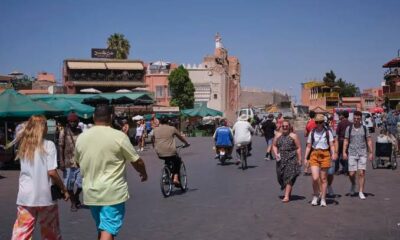

Moroccan tourist arrivals hit record-breaking 16 million
The year 2024 has seen Morocco celebrate a record-breaking 16 million tourist arrivals, surpassing the 12 million mark set in...


Safaricom Ethiopia launches 4G network in Gambella
Ethiopia’s second largest telecom provider, Safaricom Telecommunications Ethiopia P.L.C., has announced the official launching of its 4G network services in...


Dumping England for Nigeria the best decision of my life— Ademola Lookman
Current African Men’s Footballer of the Year, Ademola Lookman, has attributed his rise in the football echelon to his decision...


Zambian NGOs rate President Hichilema’s reforms as not far-reaching
Two Non-Governmental Organizations (NGOs) in Zambia, the Transparency International-Zambia (TI-Z) and the Continental Leadership Research Institute (CLRI), have rated the...
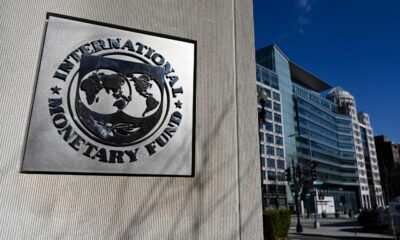

IMF, Egypt reach agreement for fourth review of Egypt’s $1.2 billion loan request
Egypt and the International Monetary Fund (IMF) have reached a staff-level agreement over the fourth review of the Extended Fund...


Libya’s eastern govt accepts petrol subsidy elimination
In a recent statement, the eastern government of Libya claimed it had reached a consensus on a plan to eliminate...


World Bank suspends loan fees for impoverished countries
To lower borrowing costs for vulnerable nations, the World Bank has announced the elimination of several loan fees. The action...
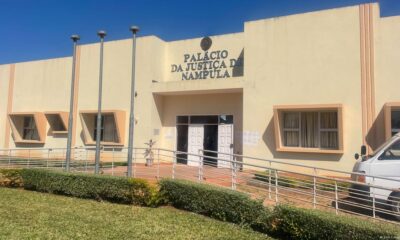

Mozambique’s top court affirms governing party’s victory in recent election
The highest court in Mozambique affirmed Monday that the incumbent Frelimo party won the October election, sparking widespread demonstrations from...


Nigeria resumes mining in Zamfara state
According to the mining minister, Nigeria has removed a five-year restriction on mining exploration in the northwest state of Zamfara,...
Trending
-

 Politics2 days ago
Politics2 days agoMozambique’s top court affirms governing party’s victory in recent election
-

 VenturesNow2 days ago
VenturesNow2 days agoLibya’s eastern govt accepts petrol subsidy elimination
-

 Metro2 days ago
Metro2 days agoZambian NGOs rate President Hichilema’s reforms as not far-reaching
-

 VenturesNow2 days ago
VenturesNow2 days agoNigeria resumes mining in Zamfara state


